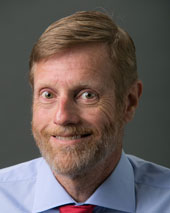
On December 27th The New York Times ran a long piece by David Kocieniewski under the headline, "Academics Who Defend Wall St. Reap Rewards."
The article constitutes an elaborate and somewhat indirect charge to the effect that two particular academics, Craig Pirrong and Scott Irwin, are sell-outs. Pirrong is a professor of finance at the University of Houston (that is his photo above) and Irwin is at the University of Illinois.
Both gentlemen (I know Pirrong slightly, he's been a source of expert commentary for me on a couple of stories I worked on, and I like him -- take that as disclosure of bias if you like) -- both gentlemen are of generally free market orientation. This does not necessarily make them defenders of wall street, since much of wall street thrives as a consequence of very non-free-market activities.
You can't really blame Kocieniewski for the headline., I guarantee he didn't write it. But he is responsible for the general slant of the piece. Koc believes that speculation on futures has been driving up the prices of the physical underlyings throughout the commodities world, especially in the energy group.
Pirrong and Irwin both have made contrary arguments. Here is Pirrong on the subject (as relates specifically to speculation regarding crude oil prices) in August 2006.
Koc is apparently of the view that his own opinion is so obviously correct that anyone who disagrees with it must be corrupt. It can't be the result of honest reasoning and factual research.
Here's Felix Salmon's take on the resulting story. Salmon's views are much less free-market than Irwin's or Pirrong's, indeed in some respects like Koc's. But he does believe in being fair.
Here is Pirrong's own take.
As Pirrong says there, the "research and writing I have done on the speculation issue received [no] financial support from any firm or entity with even a remote stake in this issue.."
Comments
Post a Comment